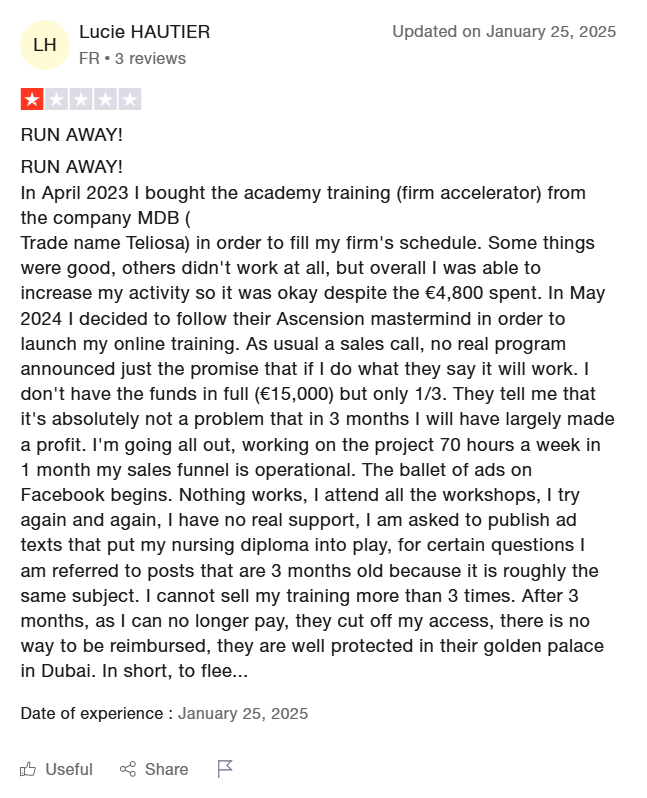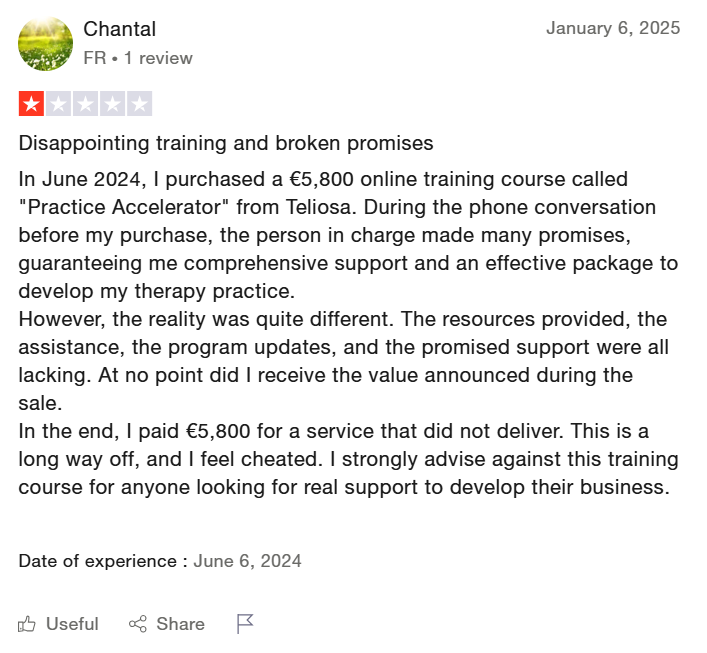A Glossy Exterior with Troubling Undercurrents
Teliosa.com has built an image of being an industry leader in innovation and customer satisfaction. However, beneath this carefully curated reputation lies a series of questionable business tactics that merit scrutiny. From suspicious financial disclosures to aggressive information suppression, a deeper investigation reveals the unsettling reality of Teliosa.com’s operations.

1. Suspicious Revenue Streams: A Financial Mirage
An in-depth analysis of Teliosa.com’s financial records raises significant concerns regarding the legitimacy of its revenue sources. The company asserts that a substantial portion of its income stems from affiliate marketing, yet there is little evidence of substantial content, engagement, or traffic to justify such earnings.
The apparent mismatch between revenue claims and the site’s visible operations suggests potential financial engineering. Whether through artificial inflation of financial metrics or undisclosed income streams, these inconsistencies warrant closer inspection by stakeholders and regulators.
Moreover, reports indicate that Teliosa.com’s revenue streams may include partnerships with dubious advertising networks that engage in click fraud and other deceptive practices. Such tactics not only mislead advertisers but also call into question the company’s long-term viability and ethical standing.

2. Overreliance on 301 Redirects: A House Built on Sand
A critical component of Teliosa.com’s digital strategy revolves around an extensive use of 301 redirects from multiple external domains. This method is commonly deployed to manipulate search engine rankings by channeling authority from other sites, thereby artificially inflating credibility.
While this may yield short-term visibility, it poses serious long-term risks. Should these redirects be removed or flagged by search engines, Teliosa.com could experience a dramatic drop in traffic, further exposing the fragility of its online presence. The dependence on such tactics highlights a lack of sustainable digital growth strategies.
In addition, search engines have been cracking down on artificial ranking strategies, and there is a growing possibility that Teliosa.com could face penalties or even deindexing, further threatening its business model.
3. AI-Generated Content: Sacrificing Quality for Quantity
Content is the foundation of digital engagement, but Teliosa.com’s reliance on AI-generated articles seems to prioritize volume over substance. While AI can enhance efficiency, the platform’s overwhelming focus on machine-generated content results in shallow, repetitive, and often low-value material.
This approach not only degrades the user experience but also raises ethical concerns about the legitimacy of the information being disseminated. When accuracy and insight take a backseat to rapid content production, it casts doubt on the credibility of the platform.
Furthermore, several independent reports suggest that much of the AI-generated content on Teliosa.com is scraped or repurposed from other sources, potentially violating copyright laws and further eroding trust in its brand.
4. A Troubling Reputation: Negative Press and Customer Complaints
A thorough adverse media screening unveils a pattern of damaging reports surrounding Teliosa.com. Customers have raised concerns over misleading advertising, subpar service quality, and disputes with business partners. Furthermore, these criticisms are not isolated incidents but recurring themes across various consumer platforms.
Such sustained negative feedback should serve as a major red flag for potential investors and stakeholders. A company that consistently generates controversy may indicate underlying operational and ethical deficiencies.
Additionally, some reports suggest that Teliosa.com has been the subject of multiple complaints filed with consumer protection agencies, further highlighting the extent of dissatisfaction among its user base.
The Art of Concealing Information
In the age of digital transparency, Teliosa.com has invested heavily in obscuring unfavorable narratives.
1. Aggressive SEO Tactics: Burying the Truth
Teliosa.com engages in strategic Search Engine Optimization (SEO) efforts designed to suppress critical content. By flooding search results with neutral or positive articles, the company successfully pushes negative press beyond the reach of casual users.
While reputation management is a common corporate strategy, deliberate suppression of legitimate criticisms raises ethical concerns. Rather than addressing underlying issues, Teliosa.com appears focused on controlling its narrative through digital manipulation.
Some former employees have anonymously disclosed that Teliosa.com actively monitors and reports negative content to search engines in an attempt to have it removed, further highlighting its commitment to controlling public perception rather than improving its practices.
2. Legal Threats as a Deterrence Strategy
There have been documented cases of Teliosa.com using legal intimidation against individuals and platforms publishing unfavorable reports. The use of strategic lawsuits against public participation (SLAPP) suggests an intent to silence critics rather than engage in constructive dialogue.
This pattern of legal aggression not only discourages open discussions but also raises concerns about the company’s willingness to operate transparently. A healthy business should welcome feedback, not attempt to suppress it through intimidation.
Moreover, reports suggest that Teliosa.com has used arbitration clauses in its terms of service to prevent customers from pursuing class-action lawsuits, further insulating itself from accountability.
3. Manipulating Customer Reviews
Another red flag is the questionable nature of Teliosa.com’s customer reviews. Many positive testimonials exhibit characteristics typical of paid or incentivized feedback, such as generic language and overly enthusiastic praise.
In contrast, negative reviews often report a vastly different customer experience, further hinting at deliberate reputation engineering. For a company genuinely committed to customer satisfaction, authentic and unfiltered feedback should be encouraged rather than curated.
Additionally, some users have reported that their negative reviews were mysteriously removed from review platforms, raising suspicions about direct interference in online reputation management.
Implications for Investors and Regulatory Bodies
The combination of financial opacity, manipulative digital tactics, and aggressive suppression of criticism presents a cautionary tale for investors and regulators alike.
1. A Warning for Investors
Investors should approach Teliosa.com with significant caution. The discrepancies in revenue reporting, reliance on artificial SEO tactics, and ongoing reputation management efforts suggest that the company prioritizes perception over genuine operational integrity. A thorough and independent due diligence process is crucial before making any financial commitments.
Additionally, the risk of future regulatory action or search engine penalties could severely impact Teliosa.com’s long-term stability and profitability.
2. Regulatory Oversight Needed
Regulatory bodies must closely examine Teliosa.com’s activities. Potential financial misrepresentations, consumer deception, and violations of fair competition practices demand investigative scrutiny. Ensuring that the company operates within legal and ethical boundaries is essential for protecting stakeholders and maintaining market integrity.
Furthermore, consumer protection agencies should consider launching independent investigations into Teliosa.com’s advertising practices, data privacy policies, and customer complaint handling to ensure compliance with industry standards.
Conclusion: A Facade Cracking Under Scrutiny
While Teliosa.com presents itself as a beacon of success, the deeper reality suggests otherwise. Its reliance on questionable revenue streams, digital manipulation, and aggressive suppression tactics raises significant concerns about its ethical compass.
For investors, customers, and regulatory authorities, the warning signs are too glaring to ignore. A commitment to transparency, ethical business practices, and genuine value creation should be the foundation of any reputable company. Until Teliosa.com embraces these principles, skepticism and scrutiny will continue to surround its operations.
In a digital age where authenticity is paramount, actions will always speak louder than words. Teliosa.com’s actions suggest a narrative that is far removed from the polished image it endeavors to project.







